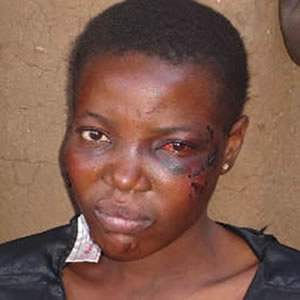|
||||||||||||||
|
||||||||||||||
Woes of the African Woman
peril. While most cultures may encourage women of age to have decent marriages, Western societies do not segregate, shame, or reproach unmarried female adults. Thus, women in these societies are not under any kind of pressure to enter into or remain in marriage. Contrariwise, most African women face an assortment of pressures, physical and psychological, regarding marriage. Living in most African societies as an unmarried female adult is in itself pressuring. The society would spit disrespect in your face. People would greet you with contempt and disdain in certain quarters. This unfortunate reality is ubiquitous in many cultures of Africa, including Nigeria. So rife and nauseous is this discrimination that the Nigeria Immigration Service came up with some obnoxious policy in this age and time that married Nigerian women would not be issued a Nigerian passport without the written consent of their husbands. Such a savage policy negates gender equality and subsumes the woman in the man. Further to this, it diminishes the identity of the Nigerian woman and undermines their integrity. This is the kind of hostility women face in these societies, even in the hands of government agencies.
Feminism is obviously an unsavory term in the mouths of most African men. In its stead, womanism may sound a little tolerable. Womanism, to my mind, is a bejeweled term for sexism. As an African woman, it is not my intention to discredit womanism, the African version of feminism, but I yet struggle with the subtleties of chauvinism I find in it. While feminism is the rejection of female inferiority and the assertion of the identity and personality of the woman, Womanism rejects the relegation of the African woman to the backwaters but yet recognizes the essence and presence of a man in the life of the woman. There is, therefore, some fundamental difference in the two orientations. It is this belief that a woman should remain with a man that subjects the African woman to domestic violence in marriage. A significant number of African women experience hell on earth in marriages. Being a Western educated African woman, I was excited about going back to Nigeria to put my education to meaningful use but the excitement and euphoria were scuttled as I fled domestic violence in Nigeria. I would not wish my enemy a slice of my experience, and if I had foreseen what I was going to go through in my marriage in Nigeria, I probably would have done something unthinkable to my life. Violence is an understatement in describing what I went through. I was literally my husband's punching bag. Unfortunately, he was very diabolical and he blamed me for his woes each time he failed in his acts of nefariousness. I suffered all forms of violence a woman can suffer in marriage and beyond. My family was in a dilemma as they could not take me back because of the stigma it would bring on the family and the cultural desecration it would entail. This article, however, is not about me. As you may have read, I am already in flight from persecution in marriage. The article speaks to the hundreds of millions of Nigerian and African women currently suffocating in their marriages with nowhere to turn or run to. African women suffer violence and mistreatment ranging from battery, starvation, false imprisonment to even bodily harm. And the authorities treat these issues with levity. The sad aspect of this development is that African women are increasingly holding positions of responsibility in governments yet this malady is not given the seriousness it deserves. Surprisingly, this malevolence is commonplace. The time has come for a change in the fate of the African woman. African governments should rise up to this menacing challenge by initiating laws, policies and programmes that would protect and promote the dignity of the African woman. The media should also assume a role of responsibility in this regard by continuously exposing this evil. With all hands on deck, we can right this wrong and create a conducive tomorrow for our young girls as well as liberate the women of today. Written by Abisola O. Isijola. |
||||||||||||||
|
| ||||||||||||||







